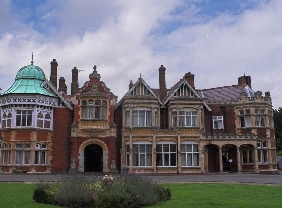Bletchley Park is the nation's foremost site of historic technological significance – with a model of the first ever computer built by British World War II engineers housed among its treasures.
But it is also embracing a range of modern technologies, Iain Standen, CEO of the trust, tells Computer Weekly.

"We are developing our own app and there is a Google programme underway to display our paper archive online," says Iain Standen, CEO of the Bletchley Park Trust. "We are using every opportunity to use technology in a way that will fit with our story – we want to make sure we are at the cutting edge."
The park is currently one of a few UK sites involved in a pilot with Google maps for its next upgrade. "Google Maps Bike has been here, so there will be a Street View of the museum shortly, which will allow you to go round the gallery, through doors and around the building," says Standen.
Bletchley has also linked up with HP and Hyland Software to digitally archive its extensive store of wartime paper documents, including intercepted messages, translations and maps.
The park's first scanning phase of the project started in 2010, as part of a five-year plan. HP is supplying the scanning hardware and Hyland Software is providing its hosted ECM solution, OnBase Online, to archive the scanned images.
Every snippet of information from the code-breaking is being catalogued manually and scanned in. It will allow researchers to trawl through the archive and cross-reference the items.
"There are German-encoded messages, which were broken, turned into German, translated and assessed for intelligence. The messages, containing high-level intelligence are in the national archives. But there are a lot of other documents that haven't been touched in 70 years," says Standen.
So far, 15,000 documents have been processed – 10% of its archive.
"At the moment there are half a dozen volunteers taking it on, but it is a laborious process," Standen says.
The database will enable the public to research the archive as well as eventually acting as a source of revenue generation, allowing users to purchase copies of specific documents.
Once the project is complete, the information will be made available on the Bletchley Park website and on information terminals around the park.
The programme will complement the park's £7.5m ten-year redevelopment project, currently underway, which includes a new visitor centre and restoration of the code-breaking huts.
"In ten years, we want it to be a world-class heritage site. Visitor numbers have already risen 30% in the first six months of this year," says Standen.
But Standen is keen to make the site as interactive as possible.
"We are always trying to develop exhibits and displays and, as we move forward [with the project], we will use more technology to help the public interpret the history," he says.





